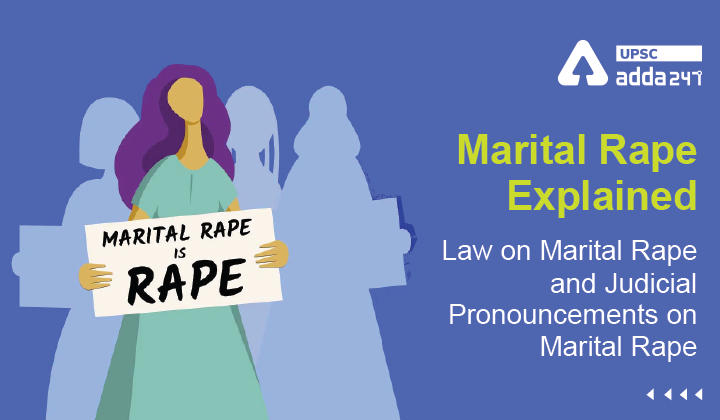Table of Contents
Marital Rape Explained- Relevance for UPSC Exam
- GS Paper 2: Welfare schemes for vulnerable sections of the population by the Centre and States and the performance of these schemes;
- Mechanisms, laws, institutions and Bodies constituted for the protection and betterment of these vulnerable sections.
वैवाहिक बलात्कार की व्याख्या – वैवाहिक बलात्कार पर कानून एवं वैवाहिक बलात्कार पर न्यायिक निर्णय
Marital Rape in News
- Recently, a two-judge Bench of the Delhi High Court has delivered a split verdict in a batch of petitions challenging the exception provided to marital rape in the Indian Penal Code (IPC).
- A split verdict in the Delhi High Court on the question of criminalising marital rape has reignited the controversy over legal protection for disregard of consent for sex within marriage.
What is Marital Rape Exception?
- Legal Provision for Rape: Section 375 of the Indian Penal Code (IPC) defines rape and lists seven notions of consent which, if vitiated, would constitute the offence of rape by a man.
- Exceptions to Provision of Rape: Section 375 of IPC contains a crucial exemption: “Sexual intercourse or sexual acts by a man with his own wife, the wife not being under eighteen years of age, is not rape.”
- Exception to section 375 of IPC essentially allows a marital right to a husband who can with legal sanction exercise his right to consensual or non-consensual sex with his wife.
The Editorial Analysis- Importance of Consent
Government’s Stand on Marital Rape Exception Explained
- In Supreme Court: In an ongoing Case in Supreme Court, Centre initially defended the rape exception and later changed its stand and told the court that it was reviewing the law, and that “wider deliberations are required on the issue”.
- The Delhi government argued in favour of retaining the marital rape exception.
- Ministry of Home Affairs set up a committee to review criminal laws in the country including exceptions to Section 375 of IPC.
- Government’s Reasoning: The government’s arguments spanned from protecting men from possible misuse of the law by wives, to protecting the institution of marriage.
Judiciary on Marital Rape Exception
- Delhi High Court: Two Judges bench of Delhi High Court delivered a split verdict on the marital rape exception.
- The larger Bench to which a split verdict goes can be a three-judge Bench of the High Court, or an appeal can be preferred before the Supreme Court.
- The Delhi High Court has already granted a certificate of appeal to move the Supreme Court since the case involves substantial questions of law.
- Karnataka High Court: While the High Court did not explicitly strike down the marital rape exception, it allowed the married man to be put on trial on rape charges brought by his wife.
- The husband had moved the High Court after the trial court took cognizance of the offence under Section 376 (punishment for rape).
- Supreme Court: Supreme Court refused to stay the Karnataka High Court order that for the first time put a man on trial for marital rape.
- The SC’s refusal to stay the order indicates that the higher judiciary is willing to carry out a serious examination of the colonial-era provision.
Marital Rape Exception in Other Countries
- The marital rape immunity was abolished in post-colonial common law countries like Australia (1981), Canada (1983), and South Africa (1993). These countries have enacted laws that criminalise marital rape.
- United Kingdom: In 1991, in their landmark decision in the case known as R v R, the Lords took the view that the time had “arrived when the law should declare that a rapist remains a rapist subject to the criminal law, irrespective of his relationship with his victim”.
- The European Court of Justice reviewed the ruling and upheld the decision of the Lords as a “foreseeable evolution” of the law.
- Subsequently, in 2003 marital rape was outlawed by legislation in the UK.
The Editorial Analysis- A Far-reaching Verdict that Ends a Regressive Exception
adda247.com/…/the-editorial-analysis-a-far-reaching-verdict-that-ends-a-regressive-exception





 TSPSC Group 1 Question Paper 2024, Downl...
TSPSC Group 1 Question Paper 2024, Downl...
 TSPSC Group 1 Answer key 2024 Out, Downl...
TSPSC Group 1 Answer key 2024 Out, Downl...
 UPSC Prelims 2024 Question Paper, Downlo...
UPSC Prelims 2024 Question Paper, Downlo...
